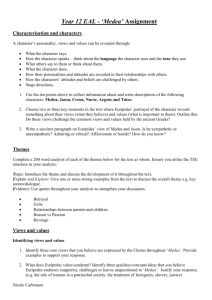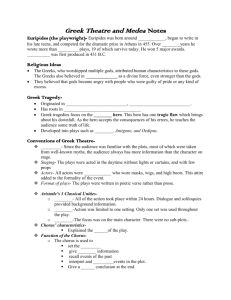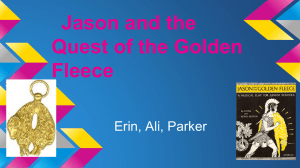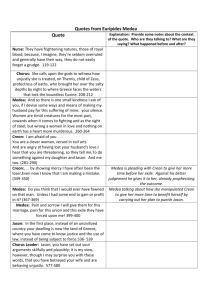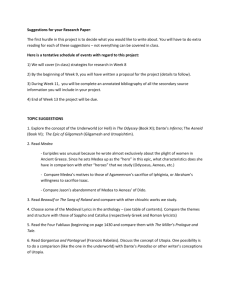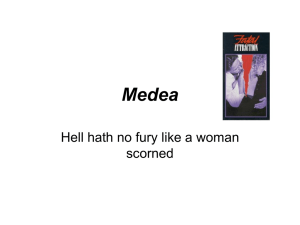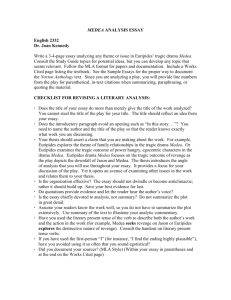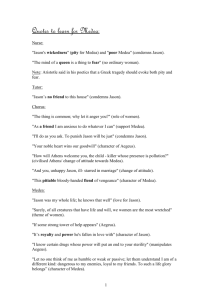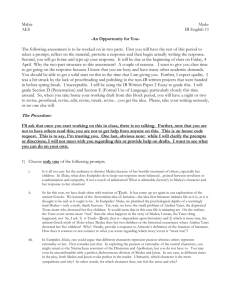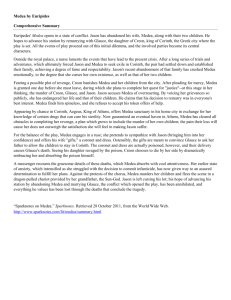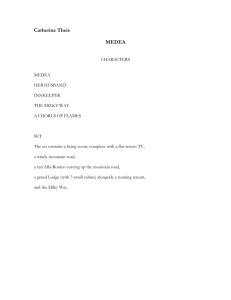Analysis Essay 3
advertisement
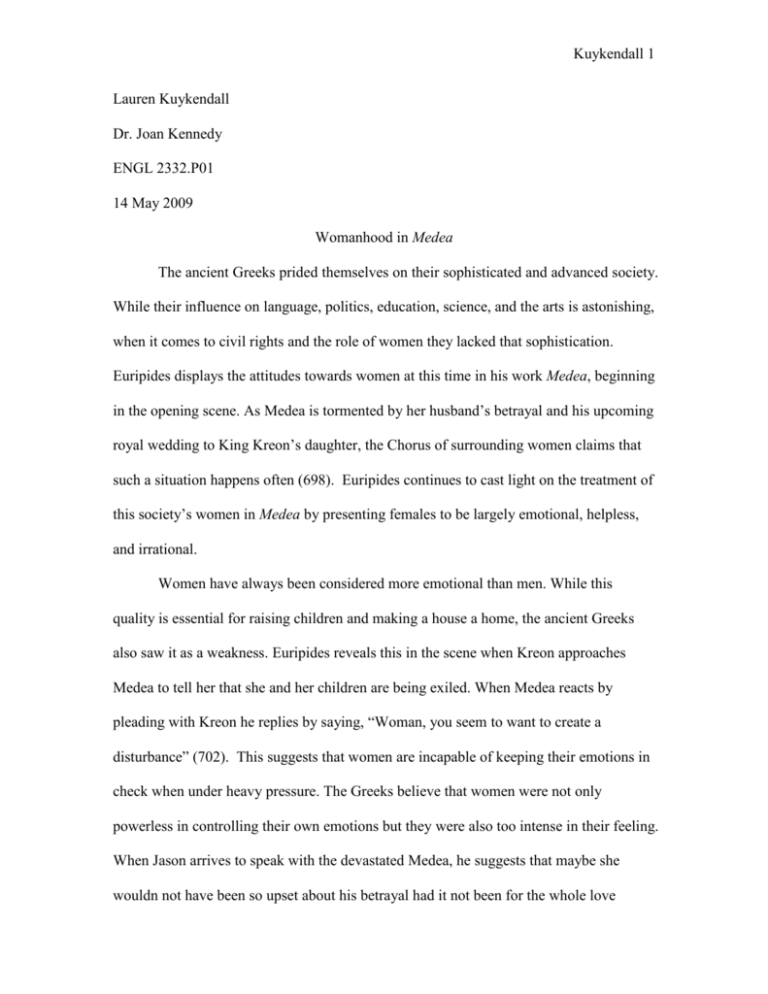
Kuykendall 1 Lauren Kuykendall Dr. Joan Kennedy ENGL 2332.P01 14 May 2009 Womanhood in Medea The ancient Greeks prided themselves on their sophisticated and advanced society. While their influence on language, politics, education, science, and the arts is astonishing, when it comes to civil rights and the role of women they lacked that sophistication. Euripides displays the attitudes towards women at this time in his work Medea, beginning in the opening scene. As Medea is tormented by her husband’s betrayal and his upcoming royal wedding to King Kreon’s daughter, the Chorus of surrounding women claims that such a situation happens often (698). Euripides continues to cast light on the treatment of this society’s women in Medea by presenting females to be largely emotional, helpless, and irrational. Women have always been considered more emotional than men. While this quality is essential for raising children and making a house a home, the ancient Greeks also saw it as a weakness. Euripides reveals this in the scene when Kreon approaches Medea to tell her that she and her children are being exiled. When Medea reacts by pleading with Kreon he replies by saying, “Woman, you seem to want to create a disturbance” (702). This suggests that women are incapable of keeping their emotions in check when under heavy pressure. The Greeks believe that women were not only powerless in controlling their own emotions but they were also too intense in their feeling. When Jason arrives to speak with the devastated Medea, he suggests that maybe she wouldn not have been so upset about his betrayal had it not been for the whole love Kuykendall 2 aspect, proposing that only women get shook up over love (707). He goes on further to imply that a woman’s high-strung passion is hardly even worth his attention: You will consider your best and truest interests Most hateful. It would have been better far for men To have got their children in some other way, and women Not to have existed. Then life would have been good. (707) However, this sentiment of resentment towards a woman’s softer side is not shown by the men only. Medea even excuses her dramatic tendencies to Jason when she is plotting her revenge, claiming that “a woman is a frail thing, prone to crying” (714). This line insinuates not only that women are inclined to be more emotional than men, but also weak and in need of a man’s support. Medea refers to women as the most unfortunate creatures. She complains of the excessive wealth it takes first just to get a good husband, only to have the husband take over the body and life of his wife. Strangely enough, even though she protests the idea she says that only then “life is enviable. If not, I’d rather die” (700). Women with husbands were seen in a different light than women without them. Women without husbands were useless. In this tirade she also touches on the way that men can go out and love more than one woman, while women are forced to stay at home with their eyes on only their husband. This alone demonstrates the women in Greek society had to submit to their husbands. This helplessness is also shown when Jason goes back to speak with Medea a second time. She reprimands him for leaving her after she had saved his life and risked everything she had to be with him, but even then Jason attributes Medea’s successes to himself: You have certainly got more from me than you gave…. Kuykendall 3 You inhabit a Greek land and understand our ways….While if you were living at The ends of the earth, nobody would have heard of you. (706) Women were defenseless to their husbands’ decisions and men felt like women needed a man to make their own. This not only made women helpless in their man’s world, but also portrayed them as less intelligent and capable. Medea learns early in the play that she is going to be exiled for speaking ill against the king’s family and the marriage involving her husband Jason and the princess. Shortly after Kreon gives her this news Jason arrives and is incredibly condescending toward Medea’s outrage and her derogatory statements towards his new wife. He tells her that she could have lived in Corinth forever had she kept her mouth shut, and even tells that her that she is lucky that exile is her only punishment (704). The tone of his voice in this conversation suggests that Jason believes Medea’s actions have been the direct consequence of considering her heart and not her head. He places the blame for the trouble she has gotten herself into solely on her foolish decision to talk badly about the king (704). Women were believed to be unintelligent in their decision-making, accrediting their emotions and not logic in their overall choices. While Medea chose not to be the helpless woman in the end of the play by killing the king and his daughter as well as her own children to get revenge on Jason, she has many female-type characteristics that both Kreon and Jason chastise. Her excessive emotion that grew out of Jason’s betrayal was what initially generated her exile. Ancient Greek society saw women in this way--as child bearers, home makers, and otherwise pests that men would just as well be better off without their presence. The idea of companionship was far off as men accomplished feats in the arts and sciences, while women like Medea were given no spotlight other than the glow of their husband’s. Kuykendall 4 Works Cited. Euripides. Medea. Trans. Rex Warner. The Norton Anthology of World Literature. Ed. Maynard Mack et al. 2nd ed. Vol. A. New York: W W Norton & Company, Inc, 2002. 3 Vols. 693-725. Print.
